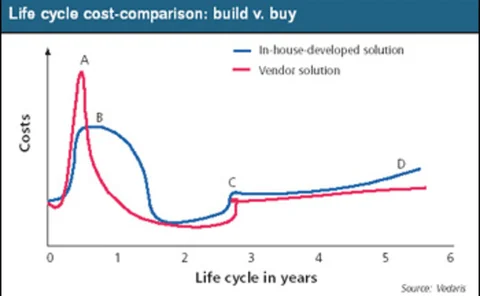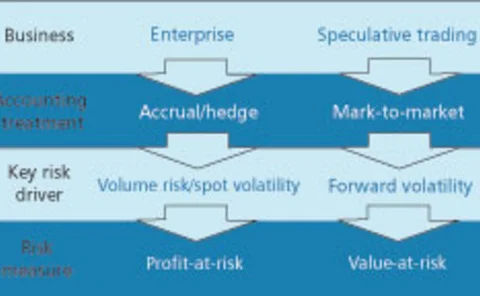Enterprise risk
How much can you take?
Given recent events, energy firms need to fundamentally re-think how they estimate their risk tolerance. Maria Kielmas asks what has prompted this soul-searching
El Paso helps RiskMetrics adapt
RiskMetrics Group, a company more often associated with the financial sector, is implementing its risk solution software at energy firm El Paso Corp. How is it adapting the software to the specifics of the energy sector? Kevin Foster reports
FAS 133: increasing transparency
Standard & Poor’s Jack Kennedy and Neri Bukspan believe new Financial Accounting Standards Board rules for US energy traders will make it easier to measure a firm’s risk management ability, liquidity position and equity capital
Mark-to-market accounting revisited
New risk disclosure and valuation regulations are aiming to revive energy trading in the US, but cumbersome accounting rules may put companies off hedging altogether, finds Catherine Lacoursière
Getting protected
Insurance premiums may have rocketed for power companies over the past year but new ‘dual-trigger’ insurance products could still be an efficient way of transferring price risk. James Ockenden reports
Tripping around credit quality
Jack Kennedy of Standard & Poor’s looks at the effect of round-trip trades on a firm’s credit quality and how they should be treated
Build in or buy out?
Is it more cost-effective for companies to buy available systems from vendors or to develop and deploy their own energy trading and risk management solutions? Bob Bridger of Vedaris looks into the dilemma faced by many companies
A joint state-space model for spot and futures power
Portfolio-wide risk management requires a model that accounts correctly for correlations between the spot asset and various futures products. Kjetil Kåresen and Egil Husby discuss a joint multi-factor model for power spot and futures prices and show how…
Know your trade types
An accurate and clearly communicated classification of the types of trade a company carries out brings a better understanding of risk methodologies and where they are best used across the enterprise, says Greg Keers
The CRO road
A company-wide understanding of risk has never been more important for energy firms. Kevin Foster talks to three chief risk officers about their role and how it is changing
The three-way knock-on effect
Peter Nance and Lin Franks look at the interplay between market, credit, and operational risks and consider how firms might approach implementing an integrated company-wide system to tackle them
Untangling the web
Ruling out the need for a major software infrastructure project, web-based concepts make perfect sense for enterprise-wide risk management systems, says Martin Chavez
Keeping EAR simple
Brett Humphreys discusses how trading groups can be captured within earnings-at-risk and cashflow-at-risk models. He suggests taking a top-down approach instead of a bottom-up approach based on actual positions
Managing risk under SMD
Scott Greene, Mark Niehaus and Pankaj Sahay examine the impact of Ferc’s proposed standard market design on power risk management
Balancing the books
Regulators are taking advantage of a lull in power project development in the US to close loopholes in financing rules, reports Catherine Lacoursière
Clear in present danger
Energy companies are crying out for clearing solutions to reduce their counterparty credit risk. James Ockenden looks at new initiatives from London-based power exchange UKPX and German firm Clearing Bank Hannover
The rise of the money men
Wanted: company to trade power in the US. Strong credit, trading expertise and appetite for risk required. Only banks need apply? By Kevin Foster
Green risks for the black stuff
The impact of environmental risk on oil companies may be substantial, says a new report by the World Resources Institute. What will the effect be on the oil majors’ stock prices? James Ockenden reviews the report
The price of good information
The accounting scandals across the US – particularly at Enron – have led to demands for more independent market data in the energy sector. Who’s providing it, and is it meeting the industry’s needs? Kevin Foster reports
Keeping an eye on the long-term
Brett Humphreys discusses the problems with standard credit risk limits and proposes limits that may work better









